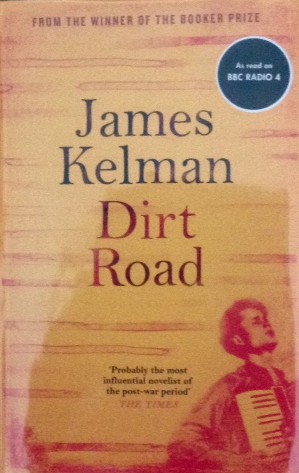Inspiring Older Readers
 posted on 04 Aug 2016
posted on 04 Aug 2016
Dirt Road by James Kelman
For someone who has won the Booker Prize – and a host of other literary prizes – Kelman doesn’t seem to have the sort of public profile his qualities would seem to command. It may be a bit of a cliché, but Kelman is, I think, very much a writer’s writer. Add to this the fact that he is proud of his Scottish heritage and will frequently use Scottish dialect and idiom in his work plus his radical political activism and you have a recipe for being marginalised.
Kelman, whilst never consciously courting controversy, found himself at the centre of a storm when he was awarded the Booker Prize for How Late It Was, How Late. And one of the judges denounced the book for its use of bad language. Kelman has always claimed that he was simply being faithful to the lives of the sort of characters he was creating and that the speech patterns were a reflection of working class Glasgow life. But, he was also aware that the rumpus created by this spat made publishers wary of handling his work. Kelman’s entry in Wikipedia has the following astute summary of his take on what might be called the on-going social class cultural war:
In his introduction to Born up a Close: Memoirs of a Brigton Boy (2006), an edition of Glaswegian political campaigner Hugh Savage's writings, Kelman sums up his understanding of the history of national and class conflict as follows:
“In an occupied country indigenous history can only be radical. It is a class issue. The intellectual life of working class people is ‘occupied’. In a colonised country intellectual occupation takes place throughout society. The closer to the ruling class we get the less difference there exists in language and culture, until finally we find that questions fundamental to society at its widest level are settled by members of the same closely knit circle, occasionally even the same family or ‘bloodline’. And the outcome of that can be war, the slaughter of working class people.”
For me, then, a new Kelman novel is quite an event and I was eager to get my hands on a copy. The publishing blurb that accompanied its release claimed that the book represented something of a departure for Kelman in that much of the action takes place in the American Deep South to the background accompaniment of Zydeco music – and this is certainly true. I also have to say that this is a slow book – by which I mean that it’s a book to be read slowly in order to savour its character because this is not a book of complex action or adventure.
Murdo is 16 years old and he and his dad, Tommy, live on a small island off the coast of Scotland and they are in mourning having had to live through the double tragedy of losing both mother/wife and sister/daughter to cancer – a genetic susceptibility found only the female line of the family. To try and help their recovery they take a trip – a short holiday – to visit family in Alabama and much of the book is seen from Murdo’s point of view. Both Tommy and Murdo are deeply trapped in their grieving although neither of them really know how to talk about it and so play out their misery in all sorts of sublimated ways. Tommy comes across as a fussily, over-attentive and cautious father while Murdo is at one and the same time a typical teenager but also someone who is on the verge of adulthood. Murdo is a musician at heart and whilst he finds the solicitous family he is visiting in Alabama comforting, something is telling him there must be more to life than he has.
His first glimpse of what might be out there for him is when he stumbles on a family of black musicians led by the formidable Queen Monzee-ay whipping up a storm on the accordion, the very instrument he plays. They encourage Murdo to play for them and invite him to join them at a music festival in Lafayette – something he initially thinks will be impossible but an idea that slowly eats into his mind. Will Murdo be able to convince his over-protective dad to let him go? Well that’s what the rest of the book is about and if you want to know how it plays out, you’ll have to read it.
Murdo’s journey down the dirt roads of the South is a journey not just into adulthood but out of mourning – not by forgetting his loss or his family but coming to terms with living his life for himself.
Kelman’s skill is to allow us into the lives of Murdo and Tommy and to give us characters that are in every sense real by not to turn them into stereotypes – there’s no sense here of the sort of inarticulate violence, drinking, drug taking or emotional incontinence that writers often use to characterise working class people in crisis. Here there is a considered, almost constipated, slow burn of emotion always on the edge of mutual understanding, always somehow missing each other. Ultimately, Murdo and Tommy love each other, and their family, but they must find ways of living apart as well as together.
Take a tip from me – find the space for this book, don’t rush it and allow it to germinate as you read. By the end it will blossom for you into the very fine novel it is.
Terry Potter
August 2016